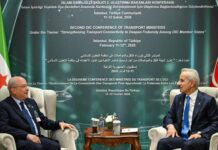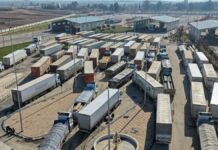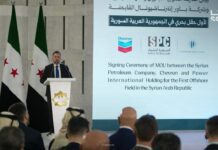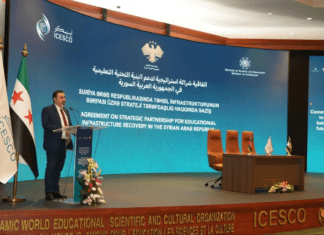
As Syria embarks on a path of recovery under the Syrian Transitional Government (STG), international calls to reassess sanctions imposed on the country have intensified. Advocates argue that the punitive measures, initially aimed at isolating the Assad regime, now disproportionately harm the Syrian population and hinder rebuilding efforts.
Humanitarian Impact
Amy Pope, Director-General of the International Organization for Migration, highlighted the pressing need for sanctions exemptions to facilitate Syria’s reconstruction. Speaking in Geneva, Pope noted the critical role of development and reconstruction in stabilizing the nation, adding that sanctions have severely limited economic activity and exacerbated the plight of vulnerable groups.
“Salaries are often insufficient to meet basic needs, and people heavily rely on cash transactions,” Pope said. She called for a reevaluation of all sanctions, including those targeting members of the transitional government, and urged greater empowerment of women in Syria’s rebuilding process.
Regional Support
Qatar has been a vocal proponent of lifting sanctions. Majed bin Muhammad Al Ansari, a Qatari Foreign Ministry spokesman, emphasized that the reasons behind the sanctions “no longer exist,” given the ousting of Bashar al-Assad. He reiterated Doha’s commitment to humanitarian aid and development in Syria, with Qatari delegations already assessing the nation’s immediate needs and infrastructure challenges.
“The air bridge operated by Qatar to provide relief to our Syrian brothers will continue as long as it is needed,” Al Ansari said, noting Qatar’s readiness to expand its support in energy, food security, and medical supplies.
US Policy Change
In Washington, the Biden administration is reportedly considering lifting sanctions on Syria for one year as a trial period to assess the performance of the new government led by Ahmad al-Sharaa. This approach includes waiving economic restrictions under temporary licenses, potentially allowing Syria to resume global trade and attract foreign investment.
Assistant Secretary of State for Near Eastern Affairs Barbara Leaf, who recently visited Damascus, emphasized the importance of supporting Syria’s political transition while maintaining accountability for minority rights, women’s empowerment, and the prevention of terrorism.
Economic & Reconstruction Challenges
Syria’s economy has been devastated by over a decade of war, corruption, and mismanagement, with the gross domestic product shrinking by over 85%. Infrastructure, including power plants, water systems, and healthcare facilities, remains in disrepair.
The sanctions, particularly those under the Caesar and Captagon Acts, restrict economic transactions, reconstruction projects, and trade, further complicating recovery efforts. Critics argue that these measures hinder access to essential goods and services and exacerbate inflation, unemployment, and poverty.
Balancing Accountability & Humanitarian Relief
International bodies, including the UN, have stressed the need to balance sanctions with humanitarian relief. The Biden administration’s consideration of temporary sanctions relief aligns with growing calls to provide Syrians with the tools and resources needed to rebuild their nation.
“Sanctions should no longer target the people of Syria but should focus on accountability for past atrocities while supporting the country’s recovery,” said Farouk Bilal, head of the Syrian American Council.
Rebuilding Syria
As diplomatic efforts gain momentum and international delegations visit Damascus to engage with the STG, lifting sanctions could mark a pivotal step toward Syria’s reintegration into the global community. However, proponents stress relief must be paired with strict oversight to ensure transparency and alignment with democratic principles. With the STG signaling its commitment to inclusivity and rebuilding, the world watches closely as Syria takes its first steps toward a brighter future.








